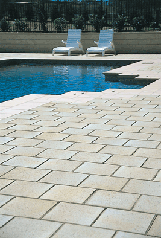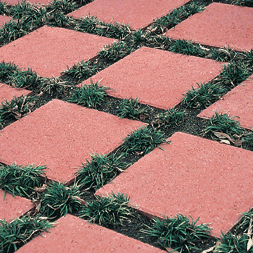|
Natural Stone Paver Material
 |
Natural stone can vary in density, from softer
to harder types of stone. The textures available can range from
smooth to glossy to quite rough surfaces. Natural stone is commonly applied to garden steps, pathways and garden borders. With a variety of colors, sizes and shapes available, there
is bound to be something to suit your needs. |
Concrete Pavers
 |
Concrete pavers are produced to imitate the look of clay brick pavers. They are made with a combination of two main ingredients; cement and aggregate.
Concrete pavers are available in a variety of styles to suit a variety of applications. There is also a large range of colors to choose from, through the use of dyes. It is however recommended that you use color sealants on concrete pavers, so as to preserve and maintain the vibrant color, when first installed.
The advantage of using concrete pavers for your driveways, walkways and patios, is that repairs are so easy to do. It is simply a matter
removing the unwanted paver, then replacing with a new one. |
Poured and Stamped Concrete
Poured concrete slabs can be stamped with a pattern, resulting in an imitation of brick or flagstone paver stones. Colors can be achieved
with the use of dyes and pigmentation; the colors may tend to fade over time.
| Poured and stamped concrete is a commonly used paver material; it can be applied to your driveway and walkways. The reason why it
is so popular is mainly due to the low costs involved, compared to other types of materials. The costs may be quite low to start off with;
however, the costs involved when it comes to maintenance can be considerable. |
|
Maintaining poured and stamped concrete involves, cleaning and regular sealing. The real costs occur if you need repairs done. Concrete
is difficult to repair, for it is sometimes necessary to re-pour from start to finish.
Clay Pavers
Clay pavers have proven to be one of the most durable types of paver material. It is a material that has been used for thousands of years, and continues to be popular today.
 |
The standout benefit of using clay pavers is their long-lasting vibrant color. Because clay is a natural material, it maintains
its natural bright color, and will never fade. The colors range from dark charcoals, browns, reds and even pink shades. Clay pavers are also available in a wide variety of shapes from the traditional rectangle to bullnose, boardwalk and interlocking
octagonal ones. There is a variety to suit any individual taste. |
Block Pavers
Block pavers are used to permeate water while maintaining the look of bricks or stone paver materials. By inserting channels in-between the joints of each block paver, the water will flow
down and gradually permeate into the soil beneath.
These permeable pavers are often used for driveways, walkways and terraces. Some manufacturers produce pavers in various shapes and patterns, which allows water to filter down slowly.
|